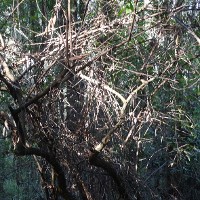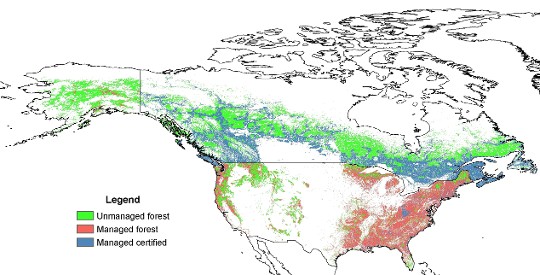Sustainable Forest Management - Certification
By 2013 about 10% of the global forest area had been certified by one of the major schemes.
During the past two decades, forest management certification (FMC) has developed as a tool supporting a transition to sustainable forest management (SFM). It also serves as a template for other certification efforts for different commodities.
However, the increase in certification has slowed from exponential to linear growth during the past decade, resulting in an uneven split of the total certified area. Moreover, most certified forest area is not in the tropics or the southern hemisphere [1].
With ESM's Earth Observation Systems (EOS) research group, PSI developed a new methodology to support assessment of future forest management certification and policymaking related to it. First results for the northern hemisphere have been presented at the 16th International Boreal Forest Research Association (IBFRA) Conference 2013 in Edmonton, Canada [2] [3].
Both main certifying schemes - the Forest Stewardship Council (FSC) and the Programme for the Endorsement of Forest Certification Schemes (PEFC) - have contacted ESM with respect to further collaboration on the topic of forest management certification.
Figure 1. Geographically explicit location of certified forest. The figure indicates the differences in the spatial distribution of forest and its certification in two major forest countries of the northern hemisphere – USA and Canada. Source: [3].
References
[1] Fernholz K, Kraxner F, Novoselov I, Resch H, Tissari J (2013). How policies, market-based tools and the green economy influence forest products markets. In: UNECE/FAO Forest Products Annual Market Review, 2012-2013, Geneva Timber and Forest Study Paper 33, ECE/TIM/SP/33. United Nations, New York and Geneva 2012, United Nations Publications, ISBN forthcoming, pp.13-22.
[2] ESM contributions to IBFRA 2013.
[3] Kraxner F, Lunnan A, Aoki K, Fuss S, Schepaschenko D, Shvidenko A (2013). Global Forest Management Certification – Future Development Scenarios with Special Emphasis on the Boreal Forest. Abstract submitted to the 16th International Boreal Forest Research Association (IBFRA) Conference 2013 in Edmonton, Canada.
Collaborators
Norwegian University of Life Sciences (UMB), Aas, Norway;
UNIDO, Rural and Renewable Energy Unit, Energy and Climate Change Branch;
Mercator Research Institute on Global Commons and Climate Change (MCC), Berlin, Germany.

Research program



